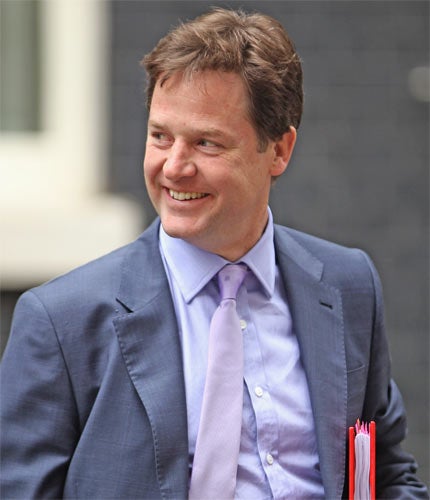Tory MPs scorn Clegg's House of Lords reforms

Your support helps us to tell the story
From reproductive rights to climate change to Big Tech, The Independent is on the ground when the story is developing. Whether it's investigating the financials of Elon Musk's pro-Trump PAC or producing our latest documentary, 'The A Word', which shines a light on the American women fighting for reproductive rights, we know how important it is to parse out the facts from the messaging.
At such a critical moment in US history, we need reporters on the ground. Your donation allows us to keep sending journalists to speak to both sides of the story.
The Independent is trusted by Americans across the entire political spectrum. And unlike many other quality news outlets, we choose not to lock Americans out of our reporting and analysis with paywalls. We believe quality journalism should be available to everyone, paid for by those who can afford it.
Your support makes all the difference.Nick Clegg's flagship plan for an elected House of Lords ran into an immediate storm of protest which cast doubt over whether he would be able to force it through Parliament.
Although David Cameron and other Tory Cabinet ministers rallied behind Mr Clegg, he provoked an open revolt by Tory backbenchers when he unveiled his proposals in the Commons.
The overwhelming majority of Tories who quizzed him during an uncomfortable 75-minute grilling poured scorn on his blueprint.
They ridiculed him for proposing that peers be elected by proportional representation (PR) so soon after losing the referendum on the voting system for general elections – and demanded another referendum on his Lords shake-up. Tory MPs cheered when Labour MPs joined them in raising fears that elected peers would challenge the long-established supremacy of the Commons.
An unbowed Mr Clegg is determined to see the first peers elected for a 15-year single term on the day of the 2015 general election, when the existing 750-member second chamber would be reduced in size by a third.
His draft Bill proposed a 300-member Lords, with 80 per cent of peers elected and 20 per cent appointed as at present. The 60 appointed members would be independent crossbenchers and the number of Church of England bishops would be reduced from 26 to 12.
Mr Clegg vowed to "use all the instruments" at the Government's disposal – which means whipping Tory MPs into line and, if necessary, using the Parliament Act to overcome strong opposition to the changes in the Lords.
A ComRes survey of 121 peers found that 78 per cent opposed a 300-member second chamber elected by PR, with only 15 per cent in favour. Although 67 per cent of Liberal Democrat peers backed the idea, it was supported by only 13 per cent of Labour peers and 7 per cent of Tory peers.
Mr Cameron signalled his personal support for Mr Clegg by sitting by his side at the start of his Commons statement. Earlier, at the Cabinet's weekly, he won strong backing from ministers including George Osborne, Theresa May and Liam Fox.
But the barrage of criticism from Tory MPs raised questions about whether Mr Cameron would be prepared to take on his own backbenchers over an issue seen as a Liberal Democrat priority – and expend energy and time on what would later become a pitched battle with Tory peers. For this reason, many MPs expect Lords reform to be kicked into the long grass next year after a joint committee of MPs and peers narrows down the options published yesterday.
Join our commenting forum
Join thought-provoking conversations, follow other Independent readers and see their replies
Comments